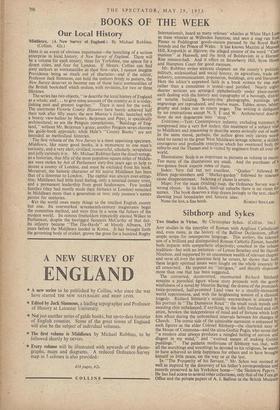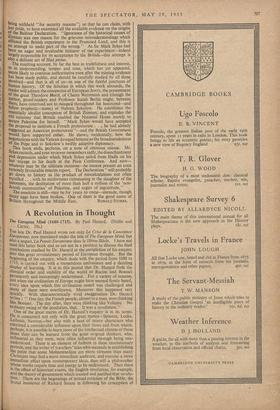Sibthorp and Sykes
Two Studies in Virtue. By Christopher Sykes. (Collins. 16s.) ANY studies in the interplay of Roman with Anglican Catholicisnl and, even more, in the history of the Balfour Declaration, afford, ample scope for intemperate language. This author, the talented son of a brilliant and distinguished Roman Catholic Zionist, handlee both impacts with sympathetic objectivity; couched in the urbane tradition—but with no imitation—of Lytton Strachey and Sir Harold. Nicolson, and supported by an uncommon wealth of relevant chapte( and verse all over the immense field he covers, he shows that both these largely spiritual issues were fought on the whole sincerely bY all concerned. He imputes no "intrigues," and sharply disprove more than one that has been suggested.
The converted, dcconverted, reconverted Richard Sibtho remains a parochial figure whose story proceeds with the gentle, wistfulness of a novel by Maurice Baring: the drama of the promised', twice-promised, half-promised Land rises to a steadily-increaSint world repercussion, and with the heightening tension of a classical tragedy. Richard Sibthorp's amiable waywardness is attested bY, his portrait in "The Damascus Road": the small weak mouth and, receding chin unbalanced, if anything, by the lofty forehead and del attire, betoken the independence of mind and of fortune which kept him afloat during the unbeneficed intervals between his changes o Church. The comic side of the admirable narration is enhanced bY such figures as the elder Colonel Sibthorp—the chartered zany o the House of Commons—and the ultra-Gothic Pugin, who wrote that "a modem altar always produces a mingled feeling of sorrow and disgust in my mind," and "evolved means of making Gothie puddings." The pathetic misfortune of Sibthorp was, that, witb all the searchings and wrestlings he devoted to his religions, be seerra to have achieved so little happiness for others and to have brought himself so little peace, on the way or at the last.
In "The Prosperity of his Servant," Mr. Sykes was assisted well as inspired by the discovery of his father's correspondence an:11 records preserved in his Yorkshire home—"the Slecimere Papers.' He has had access to several other collections, only that of the Fore:go' Office and the private papers of A. J. Balfour in the British Museunr being withheld "for security reasons"; so that he can claim, with Just pride, to have examined all the available evidence on the origins Of the Balfour Declaration. "Ignorance of the historical causes of Zionism was one reason for the grievous misunderstandings which afflicted the British experiment in the Promised Land, and this is an attempt to undo part of the wrong." As Sir Mark Sykes had been an eager and invaluable initiator of the experiment—indeed largely responsible for its acceptance by the British—this attempt is also a delicate act of filial pietas. The resulting account, by far the best in truthfulness and interest, as in understanding, temper and tone, which has yet appeared, Seems likely to continue authoritative even after the missing evidence has been made public, and should be carefully studied by all those involved—and that is all of us—in one of the fateful junctures of human history. Of the felicities in which this work abounds, the reader will admire the conspectus of European Jewry, the presentment of the great Theodore I4erzl, of Chaim Weizmann and (though the author, proof-readers and Professor Isaiah Berlin might, between ,Ment, have contrived not to misspell throughout his honoured—and fellow prophetic—name) of Nahum Sokolow. He establishes the essentially idealist conception of British Zionism, and explodes the Old calumny that Britain enabled the National Home merely to secure Palestine for herself. "Mark Sykes would have accepted the proposal to institute a French protectorate . . .; he had already suggested an American protectorate"—and the British Government would have supported either. He shows, incidentally, how the negotiations with the Vatican do equal honour to the broadmindedness of the Pope and to Sokolow's swiftly adaptive diplomacy.
This book ends, perforce, on a note of ominous unease. Mr. SYkes records, and your reviewer remembers sadly, the disenchantment and depression under which Mark Sykes sailed from Haifa on his last voyage to his death at the Paris Conference. And now— 'whatever may be the ultimate outcome—he cannot present an even remotely favourable interim report. The Declaration "will probably 80 down to history as the product of miscalculations not often equalled . . . with its misfortunes culminating in the slaughter of the Innocents, the destitution of more than half a million of the 'non- Jewish communities' of Palestine, and orgies of ingratitude." The omelette is still—may be for years to come—unmade, though many eggs have been broken. One of them is the good name of



































 Previous page
Previous page